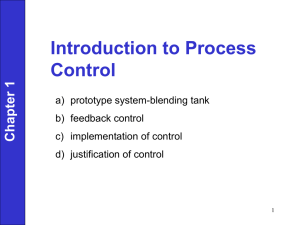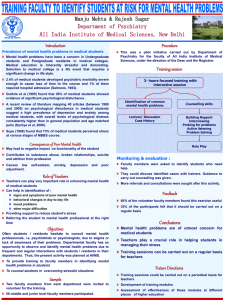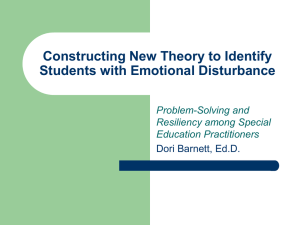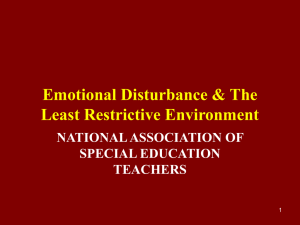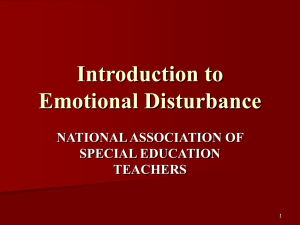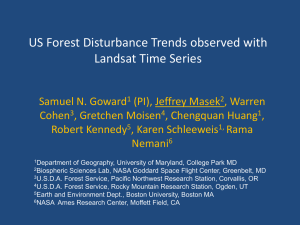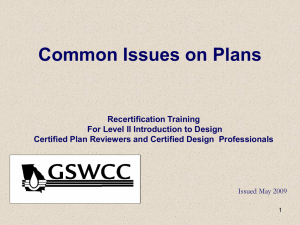Public Works Act Disturbance Claims and Reasonable Costs
advertisement
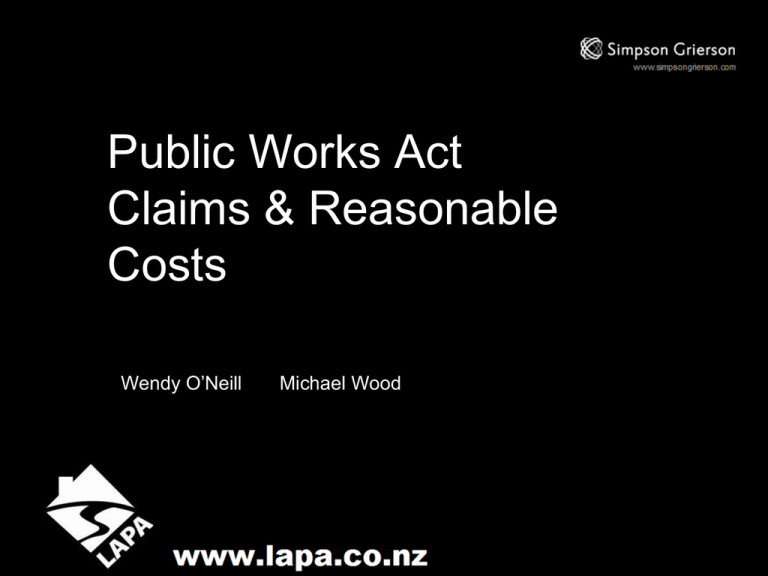
www.simpsongrierson.com Public Works Public Works Act Act Claims & Reasonable Claims & Costs Reasonable CostWendy O’Neill Michael Wood Wendy O’Neill Michael Wood www.simpsongrierson.com Section 66 Disturbance Claims www.simpsongrierson.com • We will be looking at the issues regarding claims for disturbance, and specifically legal costs, under section 66(1) of the Act: “…the owner of any land taken or acquired under this Act for a public work shall be entitled to recover compensation for any disturbance to his land and in particular to recover, where appropriate:-… (ii) The reasonable valuation and legal fees or costs incurred in respect of the land taken or acquired” Section 66 Cost Claims www.simpsongrierson.com – A more detailed analysis of the relevant law – New Zealand and overseas case law – The difficulties that can arise in dealing with such claims – The ways in which those difficulties can be addressed in practice Section 66 Cost Claims www.simpsongrierson.com • The reimbursement of landowners costs historically have not been significant, however, over the last 5 years owners’ negotiators/advocates have surfaced • Acquisitions have become more complicated • Solicitors have taken a more active role in negotiations whereas previously landowners had largely carried them out themselves • Some advocates have claimed that their services will be cost neutral Section 66 cost claims www.simpsongrierson.com • The question of what is “reasonable” in any particular case is often not easy to determine • There is very little guidance in NZ case law • The acquiring authority can be placed in the situation of having to determine questions of reasonableness • For Crown acquisitions a LINZ accredited agent makes a recommendation so that the decision is taken independently of the Crown entity • For Territorial Authorities that decision must be made themselves Legal Issues www.simpsongrierson.com • The meaning of “disturbance to land” • The meaning of “reasonable…legal fees or costs incurred in respect of the land taken or acquired” • Recovery of legal costs (as an element of disturbance) was formerly considered as part of the entitlement to full compensation • Now treated as a separate claim in section 66 PWA “REASON HAS ALWAYS EXISTED, BUT NOT ALWAYS IN A REASONABLE FORM”. . Karl Marx www.simpsongrierson.com Reasonable: definitions • Oxford Dictionary definition includes – fair – moderate – appropriate – average • Merriam-Webster definition includes – in accordance with reason – not extreme or excessive – moderate – inexpensive www.simpsongrierson.com Reasonable: definitions www.simpsongrierson.com • Black’s Law Dictionary: Fair, proper, just, moderate, suitable under the circumstances. Fit and proper to the end in view. Having the faculty of reason; rational; governed by reason; under the influence of reason; agreeable to reason. Not immoderate or excessive, being synonymous with rational, honest, equitable, fair, suitable, moderate, tolerable Disturbance: English law www.simpsongrierson.com • In England the statute does not deal with disturbance claims separately as the PWA does • Disturbance payments are made to owners to compensate for any loss that flows from the taking of the land and is not too remote and is the natural and reasonable consequence of the taking • The cases therefore do not focus on the question of what is reasonable • The cases are however instructive in understanding disturbance generally Disturbance : English case law www.simpsongrierson.com • Horn v Sunderland Corporation (1941) – The dispossessed owner is entitled “to be put so far as money can do it, in the same position as if his land had not been taken from him. In other words, he gains the right to receive a money payment not less than the loss imposed on him in the public interest, but on the other hand not greater” • Harvey v Crawley Development Corporation (1957) – “any loss sustained by the dispossessed owner…which flows from a compulsory acquisition may properly be regarded as the subject of compensation for disturbance, provided first that it is not too remote and , second, that it is the natural and reasonable consequence of the dispossession of the owner” Disturbance : English case law www.simpsongrierson.com • Director of Buildings and Lands v Shun Fung Ironworks (1995) (HKPC) • Three conditions must be satisfied (a) “There must be a causal connection between the resumption or acquisition and the loss in question” (b) “The adverse consequences to a claimant whose land is taken may extend outwards and onwards a very long way, but fairness does not require that the acquiring authority shall be responsible ad infinitum. …The law describes losses which are irrecoverable as too remote” Disturbance : English case law www.simpsongrierson.com • Shun Fung (continued) (c) “The law expects those who claim recompense to behave reasonably. …if a reasonable person in the position of the claimant would not have incurred, or would not incur, the expenditure being claimed, fairness does not require that the authority should be responsible for the expenditure” • This is commonly referred to as the duty on the part of the claimant to mitigate his or her loss • The onus is on the acquiring authority to prove that the landowner has acted unreasonably or has failed to mitigate his or her loss, and the standard of what is “reasonable” should not be set too high Disturbance : Canadian case law www.simpsongrierson.com • Canadian case law in cases of disturbance is of interest where the statutory provisions refer to “reasonable” costs • These cases are not authoritative in New Zealand but may be persuasive: there are few NZ decisions in this area • These are examples only Disturbance: Canadian case law www.simpsongrierson.com • Amdue Holdings Ltd v City of Calgary (1980) suggested the following general principles: – full costs of and incidental to an application properly made…should be paid by the expropriating authority. The costs should however reflect such reasonable, economical and straightforward preparation and presentation as is necessary to properly present the owner’s case to the Board. – The owner should not be allowed the cost of unnecessary work or other expenses or costs incurred through over-caution or over-preparation. – The owner should not be allowed costs which are the result of misconduct, omission or neglect by the owner. Disturbance : Canadian case law www.simpsongrierson.com • Nygard v Corporation of District of Surrey (1989) – Considered the meaning of “reasonable”, and referred to definition in Black’s Law Dictionary – “The quantum of costs, and particularly of fees, must be reasonable, having regard to amount of the award, the number and complexity of the issues involved, the time expended by the claimants’ solicitors and expert advisers, the degree of skill and competence demonstrated by them and the degree of success realized in the proceedings” – Reduced legal costs by 20% Disturbance : Canadian case law www.simpsongrierson.com • Examples of factors that may be relevant, as discussed in Nygard: – Inexperience of counsel meant time was needed to research the relevant law – Unnecessary duplication of effort between counsel and junior solicitor – Over-caution or over-preparation – Doing necessary work in a time-consuming manner – Work carried out at an inappropriate rate – The solicitors may be entitled to be paid for some of these items, but by their client not by the authority Disturbance : NZ case law www.simpsongrierson.com • Gold Star Insurance Company ltd v Minister for Land Information (2013) – Adopted the principles in Shun Fung decision as to three conditions for disturbance claims – Must be causally connected by the taking – Must not be too remote – Must not be a loss which a reasonable person would have avoided – The word “disturbance”, while not defined in the Act, should be given its natural meaning in the light of its context among other provisions, in particular the examples listed in s 66(1) – Those examples are not exclusive but provide a basis for interpretation, such that any claim should be analogous to the examples NZ case law www.simpsongrierson.com • Stringer v Minister of Lands (2014) • HC decision on costs, appeal from LVT • LVT considered the amount of the claim unreasonably high having regard to the amount of the compensation actually awarded (almost 3 times the figure awarded, although more than Crown’s offer) • LVT had awarded costs of $20,000 in total • HC awarded full pre-LVT s66 costs claim of $40,000 • But also said there were “special reasons” so claimant not entitled to full recovery of costs under s90 • Awarded interest on costs Time of Reimbursement www.simpsongrierson.com • Historically, reimbursement tended to occurred at the end of the acquisition process • Now it often occurs during the negotiations as not all landowners are in a position to pay the costs of their valuer, solicitor or negotiator until the final settlement. • It is now common practice for both the Crown and territorial authorities to reimburse as the negotiation progresses to reduce the financial burden on landowners, especially if negotiations are continuing but protracted Types of Costs www.simpsongrierson.com The most common fees are legal and valuation costs. Other types of fees are: • Negotiation consultants • Accountants • Engineers and technical experts: planning, geotechnical, noise, traffic modelling Landowners cannot charge for their own personal time. Factors www.simpsongrierson.com • The complexity and difficulty or novelty of the issues • The value of the property interests being acquired • The level of understanding or sophistication of the landowner • Specific issues such as the age of the owner and language • Possibly, the extent to which the owner engages in negotiations, or whether a purely adversarial approach is evident Factors www.simpsongrierson.com • It should not be influenced by factors such as the knowledge, skill or experience of the legal advisor • It is to be expected that legal advisors should have the necessary knowledge, skill and experience to undertake the work • However in practice the level of claims is often influenced by such factors Obligation to Minimise Losses www.simpsongrierson.com Landowners responsibilities: s71(4) PWA • The courts have ruled that there is an obligation on landowners to take all reasonable steps to ensure that their losses are kept to a minimum. This is expressed as a duty to mitigate losses, which also applies to damages in civil claims • It is important that they keep records of all communications, expenses incurred and losses sustained • They can only receive compensation for expenses and losses incurred as a direct result of the acquisition of their land If their losses increase as a result of their own actions (or lack of them) they will not received compensation Obligation to Minimise Losses www.simpsongrierson.com Mitigation www.simpsongrierson.com • Always explain the project, the area to be acquired, who the contact for the TA will be. • Valuations – inform them of their right to obtain their own valuation, ensuring valuer is aware of PWA requirements and how costs will be dealt with. • Make it clear that only reasonable fees will be reimbursed. • Explain the process around recovery of costs, when they will be paid, what documentation is required and request they obtain your prior approval to engaging additional consultants beyond solicitors and valuers. • Clear communication on costs is essential. Avoiding Pitfalls www.simpsongrierson.com • Effective upfront communication from the outset of negotiations is essential to mitigate difficulties with cost claims which may result from a lack of understanding by landowners of their rights and requirements • The initial contact letter must be carefully worded to ensure landowners are fully aware of their rights and responsibilities relating to negotiations under the Act and there is clarity around the fee reimbursement requirements and process • They should be made aware that the obligation is not to indemnify for all costs incurred, but only reasonable costs Costs Claim Process www.simpsongrierson.com • Have a consistent process for dealing with costs claims, dealing with: – How the costs claims should be presented – What information should be provided with each claim – Who will review the claims • Make sure communications on costs are consistent and clear • Explain that if they are not satisfied with decision on the costs claim, they may have the matter determined by the LVT Avoiding Pitfalls www.simpsongrierson.com • Keep details of all relevant previous claims and spread sheet them to provide baseline data for future claims • This will provide you with an on-going overview of costs incurred for different types and values of acquisitions • You can derive important information from this, for example the average costs to apply to any future claims for reimbursement • In a litigation situation this information becomes invaluable as strong evidence of “standard” costs involved in similar types of acquisitions Why This Approach? www.simpsongrierson.com • To ensure landowners are fully aware of rights and options • To allow landowner fee claims to be agreed if possible and dealt with expeditiously. • To minimise disputes and rejection of claims • To pre-empt the arguments that might be raised at the Land Valuation Tribunal. End Result www.simpsongrierson.com • Uniformity and standardisation of practice by both Crown and Local Authorities. • Local Authorities can claim use of “ Best Practice” in assessing and dealing with costs claims. OUTCOME www.simpsongrierson.com www.simpsongrierson.com QUESTIONS? Acknowledgements LAPA LINZ www.simpsongrierson.com


